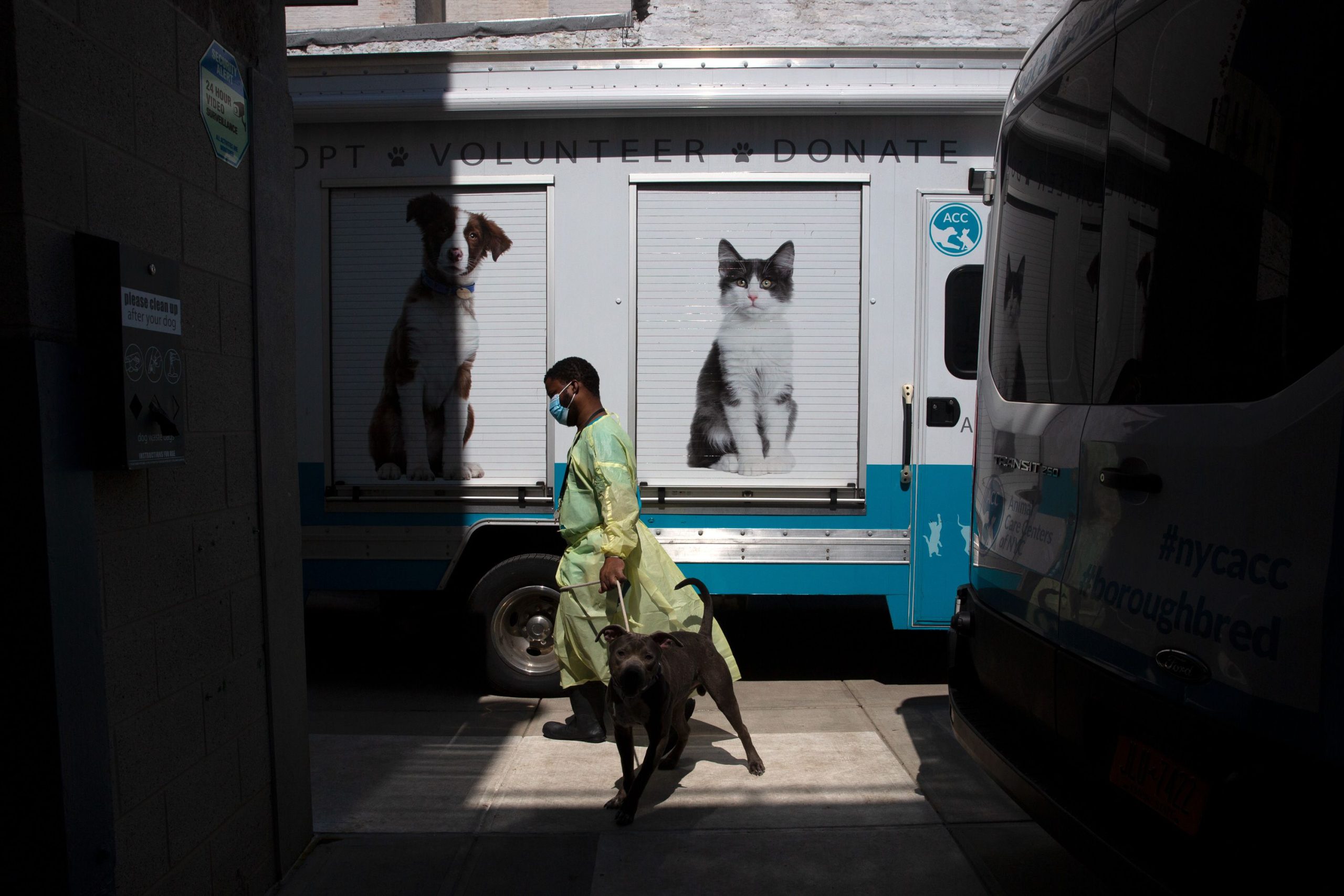Buttons, a white and brown domestic short-haired cat, has lived since May 18 inside a double-wide cat condo at a city animal shelter.
He’s luckier than Grubhub, who has spent two days inside a “pop-up kennel” a few feet away, after being found under a bench July 29 outside the East Harlem facility of Animal Care Centers of NYC.
The silver 4-month-old kitty with a delivery app’s name arrived at the shelter even after the city’s animal care agency announced last week that its three shelters were, for the first time in recent memory, closed to cat intake due to overcrowding.
Officials at ACC, the city-supported nonprofit shelter network, say financial pressure on pet owners is partially to blame for a surge in the number of cats being surrendered.
At the East Harlem location, cats are being stashed in crates that line the corridors, a sign of a crisis mirrored at shelters across the country.

Some dogs, like Brooklyn, live in a kennel inside an administrative office. He was dropped off at the shelter more than four months ago after his owner never claimed him from a friend’s house.
“I think it all trickles down to nobody being really able to financially support animals,” said Dorothy Blomquist, an admissions supervisor at ACC’s Manhattan location.
Blomquist said she sees 30 to 40 animals being turned in to the shelter daily, with most people citing finances as the reason they have to surrender a pet.
“We try to supply people with food, but there’s some people who just find themselves in situations where they have to make decisions between their own health and their animal, and their family’s health and their animal,” she added.

Animals in Need
Even after ACC cited “critical capacity issues” when it restricted its intake of cats, close to 100 were handed off at the shelters in recent days.
“We would never not accept an animal in need,” Katy Hansen, the ACC’s director of marketing and communications, told THE CITY on a tour of ACC’s East Harlem site on Monday.
Since January, 2,918 pets have been adopted from ACC shelters — but in the same seven-month period, the agency took in 7,493 cats, dogs, guinea pigs and rabbits, data shows.
For the same time last year, there were 2,769 pets adopted out of 6,702 pets taken into the shelters.
In all, ACC took in more than 15,000 pets last year, though the agency has faced criticism for putting down some of the pets taken in at the shelters. Last year 2,941 animals died at ACC facilities, mostly by “owner-intended euthanasia,” a service ACC provides to low-income New Yorkers, according to a spokesperson.

Jen Brooks, who runs NYC Second Chance Rescue, also pointed to financial issues as source of the problem.
Pet food and veterinary costs have skyrocketed, Brooks said. The COVID-era eviction moratorium helped some people stay at home with their pets, but she’s seen some people bring in cats and dogs after they’ve been forced to find new homes.
“Shelters are just packed, owner surrenders are on the rise, finding adopters and fosters just seems to get harder and harder,” said Brooks, whose rescue organization has a facility in Westchester County and is opening another in Long Island City.
“A lot of people might be struggling financially and it’s a recipe for disaster for the animals,” she said. “It’s now a luxury to be able to have a pet, for a lot of people.”
Hundreds Ready for Adoption
ACC currently has more than 500 cats, dogs, guinea pigs, and rabbits ready to be adopted or placed in foster homes, Hansen said.
And as the city’s official shelter, ACC is required to take in animals, with the goal of getting them into permanent homes, she said.
The agency last year hired two counselors to work on special cases, THE CITY previously reported — helping people to keep their pets even if experiencing a mental health crisis, facing eviction, or dealing with another financial challenge.
Still,more animals arrive than get adopted, with not enough space to house them all.
A 50,000-square-foot shelter was supposed to open last year in Ridgewood, Queens, but has been delayed by construction issues. It’s now scheduled to open early next year, Hansen said.

Doug Halsey, who runs Ready for Rescue — an organization that takes in pets who were facing death at an ACC facility — said several factors have led to the capacity crunch at shelters.
Halsey said he’s seeing fewer people interested in providing foster homes for pets.
“We’re basically playing musical cats and dogs with a lot of our fosters,” he told THE CITY.
Through the summer, ACC is encouraging the adoption of large dogs and adult cats over age 5 with just a $5 adoption fee. To help encourage more fosters, ACC is also covering the cost of a Lyft once you pick up the pet. And they continue to host mobile adoption events across the city as they look for new volunteers.
Halsey said the problem ultimately falls on the humans to care for what local shelters call “boroughbreds.”
“We have a responsibility due to mankind’s co-opting of animals to make them domesticated pets,” he said. “It’s on us.”

